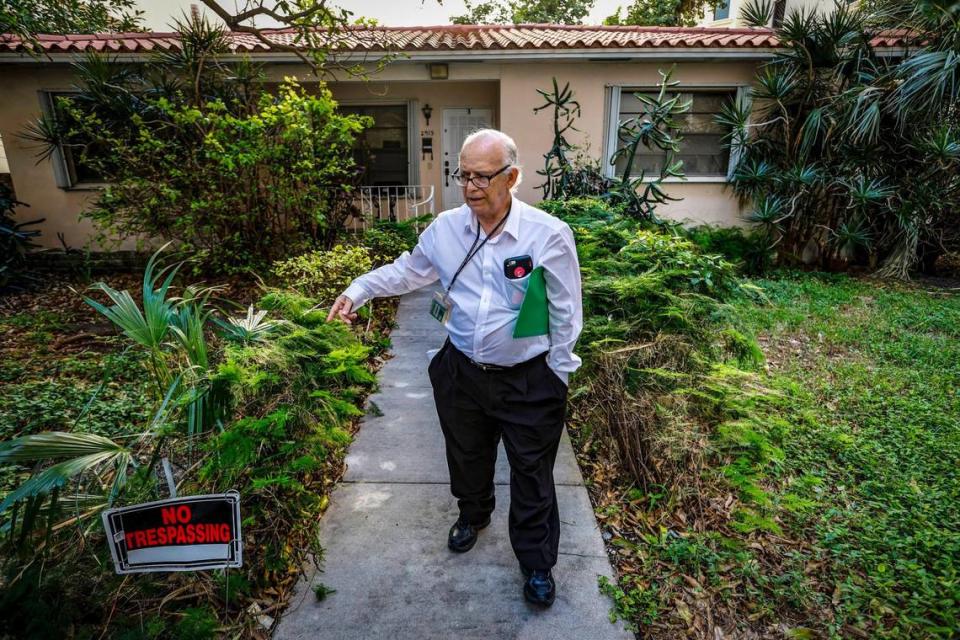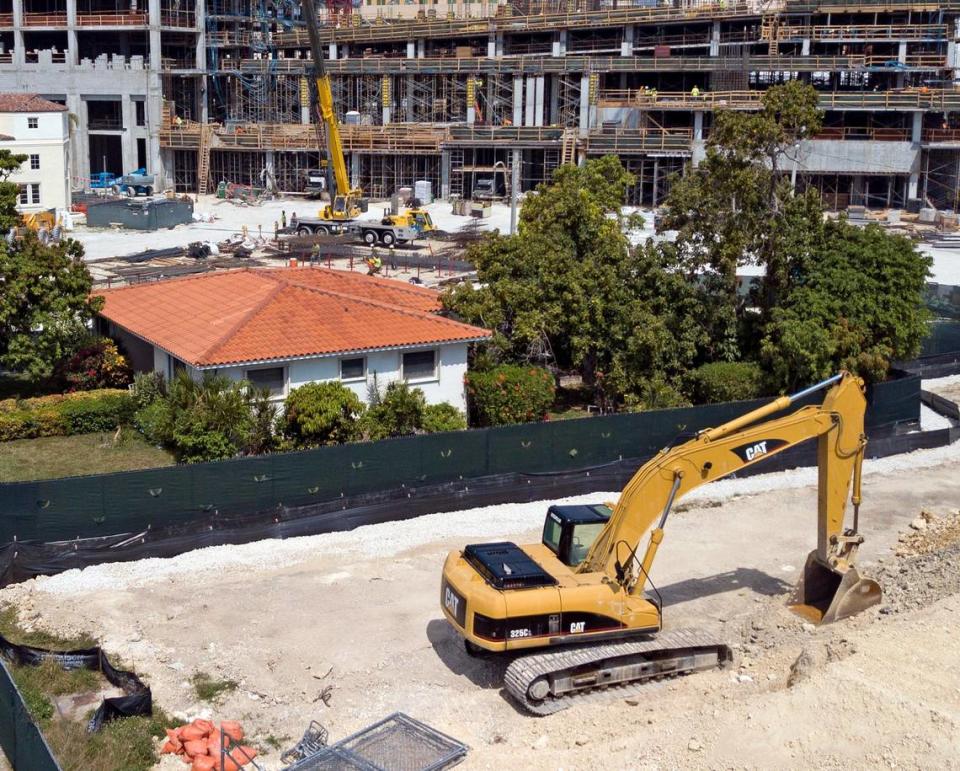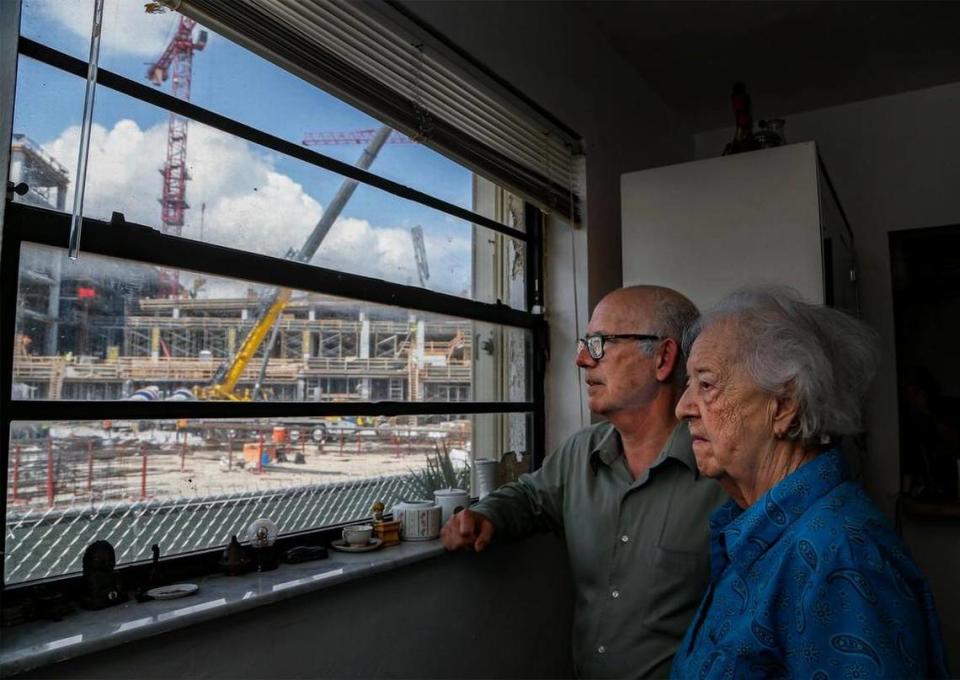Don Quixote of Coral Gables: How one homeowner is fighting city hall over his carport
The man in the little house engulfed by the biggest development in Coral Gables history — surrounded by 100-foot-tall parking garages and a 15-story hotel — has a new problem disturbing the tranquil life he once led on Coconut Grove Drive.
It’s not the bulldozers roaring by his kitchen window, cranes dangling over his barrel-tile roof, jackhammers jarring the crystal keepsakes in his china cabinet or six Porta Potties planted by his backyard patio. No, he is no longer living in the middle of a construction zone.
Orlando Capote survived that five-year ordeal only to be bedeviled by his own carport. Specifically, the cover of his carport.
READ MORE: One small home is now surrounded by a giant construction zone. Why the owners are staying
Call him principled. Call him obstinate. Capote is arguing with the city over the material allowed atop his carport. He put up a tarp —rejected. He tried black mesh — rejected. Now he’s insisting on vinyl, holding up green swatches. But the city code mandates canvas, with a manufacturer’s tag on it.
The City Beautiful prohibits anything ugly.
Lien notice from Coral Gables
He has accumulated $29,000 in fines since June and last week received a Notice of Intent to Lien — a warning that his house will be seized if he doesn’t pay within 30 days.
“The city thinks it can harass me until I give up and move,” he said. “I have no intention of moving. Ever.”
So, Capote is in another fight with Coral Gables City Hall. Using his encyclopedic knowledge of zoning laws and property rights, he started fighting the city over variances, setbacks, alley access, height restrictions and fire code rules when the 7-acre, $600 million Plaza project was approved 10 years ago and the developer bought and demolished all of Capote’s neighbors’ houses.
But not his. He refused to sell the 1,300-square-foot, two-bedroom home where he lived with his Cuban-immigrant parents since they purchased it for $135,000 in 1989. The developer, Agave Holdings, offered to swap him a larger house nearby. He turned it down, as well as offers as high as $900,000.
“This was their American dream,” Capote said of his late father and mother. “I’m honoring their dream. I’m staying here.”

The Plaza Coral Gables, and its 1.1 million square feet of shops, restaurants, offices, luxury condos and soaring parking garages, was designed and built around Capote’s house. His front door faces the Loews Hotel entrance, where a constant stream of cars come and go from the valet parking stand. Guests can look out their windows onto his yard. On the west side, Cantina Leon will soon open, and he can already hear the music, clatter and chatter during happy hours. To the east, the blank wall of an 8-story garage, and the hum of a generator encased in it. In back, behind his avocado trees, another wall and an electric transformer.
“Last summer was the first time my mango tree did not produce fruit,” said Capote, 68. “There’s not enough sun living in the shadows of these buildings. I’m walled in.”

‘Exorbitant rent, ridiculous fines’
Was Capote a fool for standing his ground? Not according to the people who come by his house daily, knock on his door or shake his hand and call him a hero. His admirers — including visitors from out of town — have read about his struggle against the powerful forces of government and real estate development.
He’s the Don Quixote of Coral Gables, famous for tilting at backhoes, the protagonist in a tragi-comedy who has proved you can beat city hall. Sort of.
“They want me out because I am a constant reminder of how government bends over backward to favor big money instead of protecting its citizens,” he said. “It’s happening everywhere. It’s shameful to see how regular people are being pushed out of their homes by exorbitant rent, ridiculous fines and developers buying entire buildings, dissolving the condo associations and forcing owners to leave so they can build another luxury tower.
“This was a nice neighborhood. This was a nice city. It was sacrificed for money. It’s being eaten alive by these monstrosities.”

Capote has been wrangling with the city over code violations since November 2022, when he was cited for an unkempt yard with excessive trash, a broken fence, overgrown grass, too many feral cats and the uncovered carport.
Capote argued that the mess was caused by years of construction damage. Pallets, rebar, shards of glass, chunks of concrete and discarded paper plates were strewn across his yard. His carport canopy was ripped by falling debris. It was difficult for him to work outside because the dust sent him into coughing fits. Over the past year, he cleaned up his yard, and has a rescue organization trapping the cats and putting them up for adoption.
But the carport covers Capote has strung across the top of the metal frame have not been in compliance with city code. A canvas canopy will be more expensive; he estimates it would cost at least $3,500. He’s gone back and forth with inspections and meetings with the Code Enforcement Board and the Board of Architects. The dispute is reminiscent of when he filed three dozen complaints against the city during the planning and building of the Plaza, when he claimed Coral Gables was breaking its own laws to accommodate the developer.

City: ‘We want to work with him’
For the carport, he says the city trapped him in a Catch-22 because it wouldn’t let him pull a permit.
“They said we’re not giving you a permit for the cover but we’re going to fine you for not covering the structure,” he said. He finally got a permit in November.
Coral Gables gave Capote a break on Thursday when officials decided to waive the fines and the lien warning. He’s been granted another 30-day extension to comply. If he doesn’t, the fines will begin anew.
“We have given Mr. Capote a few extensions,” said city spokesperson Martha Pantin. “We want to work with him to resolve and expedite this matter and make sure he’s up to code. “
Capote, an electrical engineer for Miami-Dade County, lives alone at the bottom of the concrete canyon. His mother Lucia, his partner in the crusade to save the house, died in a rehabilitation facility at age 94 in 2022, three months after she fell in the kitchen and broke her leg.
Capote had dreaded such an emergency, and had constantly complained to the city about the lack of access to the house in case firefighters or paramedics needed to respond. When his mother fell and he called 911, a backhoe was blocking the front entrance.
Paramedics drove in through the back alley but their gurney wouldn’t fit through the back door. They had to move their ambulance to one end of Coconut Grove Drive, which was fenced off to all traffic except for construction vehicles, and wheeled Capote’s mother 210 feet down the street.

“Another example of how the developer comes first, before the citizens,” he said.
Capote’s mother was making tea to calm his coughing when she fell. He misses her. He misses his old neighbors. He’s determined to fix the carport and keep the house at 2915 Coconut Grove Drive.
“My parents lost their house in Cuba and worked very hard to buy this one,” he said. “The memories will live as long as I live here. This is the best place for me, despite what has happened.”

